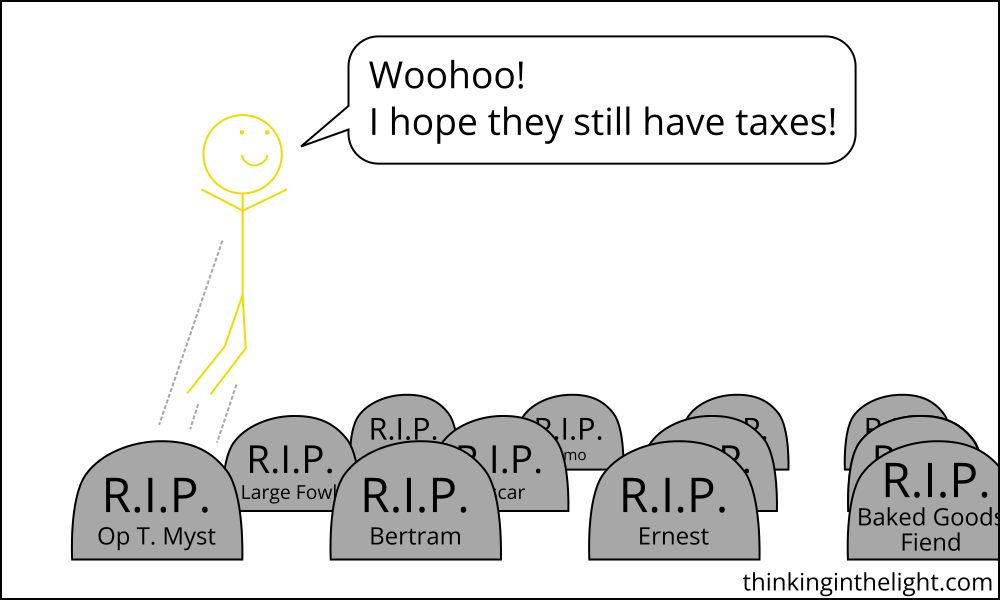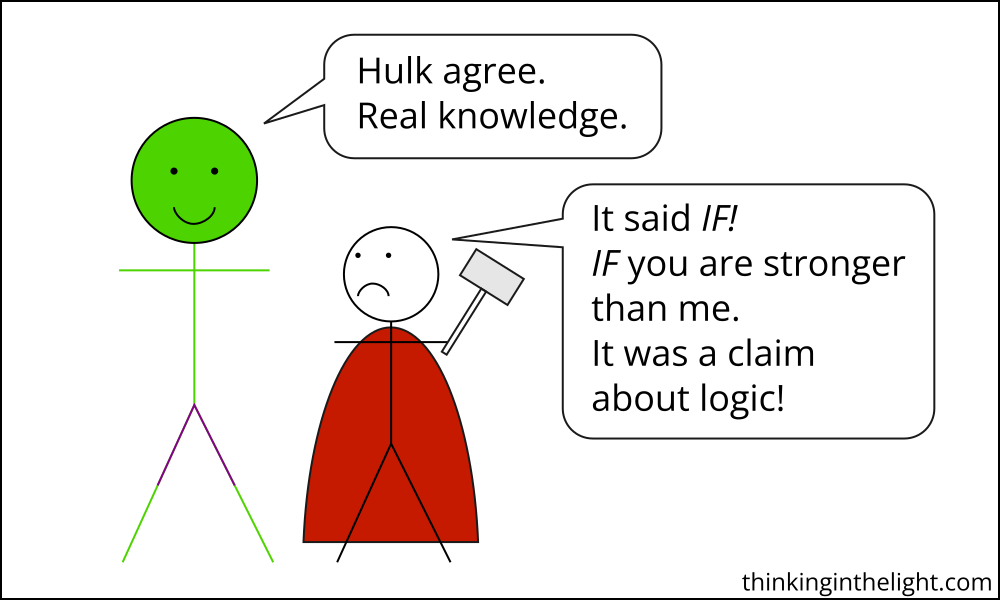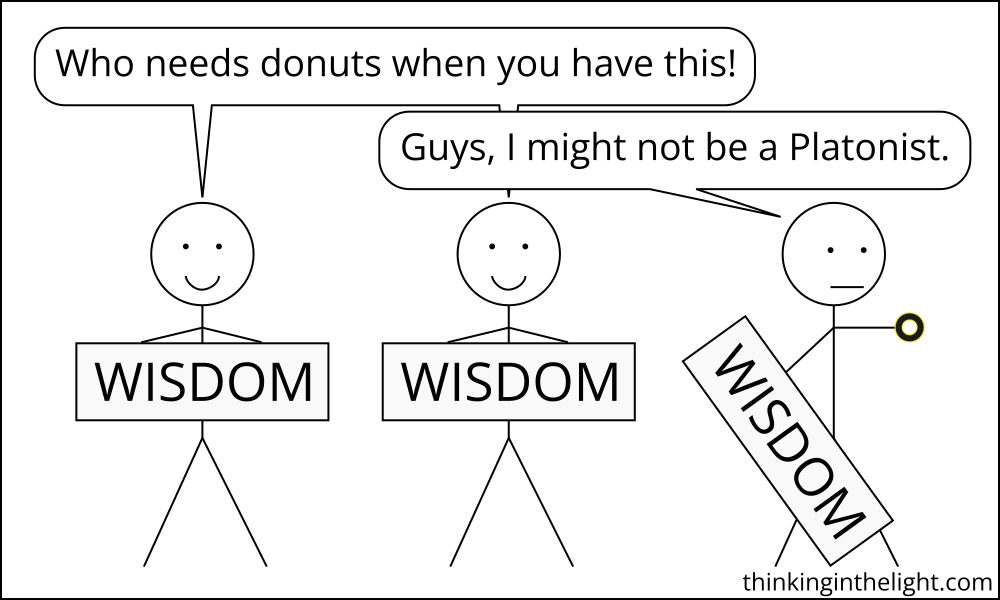Plato on the Disembodied Afterlife
Part 3 of the series Shuffled Off (Thinking about Death)
They say that there is nothing certain in life but death and taxes. This is supposed to be a sobering or depressing saying, with the idea being that no one likes either.

So far in this series, however, we have seen two ancient Greek philosophers serve as counterexamples: neither Epicurus nor Epictetus think that death is something bad. (Epictetus wouldn’t object to the taxes, either.) If we turn to the most famous Greek philosopher, Plato, this trend doesn’t change. In fact, he goes even further than the other two and says that death is something good.
It sounds crazy to say that death is good, so why would Plato do this? Is he depressed? Is he a masochist? Is he a philosopher who likes to take contrarian positions? (Well, yes to the last one, but that is not the reason.) The simple answer is that Plato thinks that there is life after death and that this life will be of a qualitatively different and vastly better kind.
This explains why his position differs from those of Epicurus and Epictetus. Epicurus is explicitly a materialist, so the death of the body is the end. Epictetus the stoic doesn’t focus on a life after death, because he confines his philosophy to addressing life in this world. So, for neither of them is a glorious afterlife on the table. It also means that Plato’s position is not going to be attractive to many in today’s society, since materialism and a focus on this life are often cornerstones of contemporary thought.
Now, Plato could respond to all these people, both ancient and modern. He offers an argument that the soul is immortal and there is life after death, and a materialist could look at it to determine whether it is a good one. But in this post I’m not going to examine this line of argumentation from Plato. (I happen to think it has problems.) Instead, I want to focus on the way that Plato’s position can sound really good to a Christian.
Plato lived and wrote prior to the time of Jesus, so since the earliest days of Christianity, Christians have had Platonism as a philosophy they could adopt. And many have found it congenial. For example, the bishop-philosopher-theologian Augustine had many Platonic elements in his thought. When he was younger—not yet a Christian but still very interested in philosophy—he told a Christian mentor that he had been reading Platonist philosophers. The mentor, Simplicianus, said it was good that he had been reading them, because while the writings of other philosophers were filled with fallacies, “those Platonist writings conveyed in every possible way, albeit indirectly, the truth of God and his Word” (Augustine, Confessions, Book 8).
It makes sense that there are elements of Plato’s thought that Christians respond to. (I certainly respond to some.) And my goal here is not to give an exhaustive account of Plato’s philosophy and how it squares with Christianity. (That would require a book.) But I do want to ask whether a Christian should find his view of death compelling. Should I see death as something good?

To understand Plato’s view of death, we first need to start with his view of the soul. Plato is a dualist, which means that he sees the soul and the body as separate things—separate substances—that only happen to be tied together. My body is alive now because my soul is in it, and at some point in the future it will cease to live because my soul will have left. But, crucially, at that point the soul itself has not died. It has separated from my body, but it is still just as much its own thing as it was before the separation. So after the death of my body, my soul still exists—I still exist. I am simply disembodied.
And Plato goes further than merely saying we will continue to live after death. He is convinced that this afterlife will be better than our lives now. This confidence is contrary to the hesitation of many when it comes to death. For example, when Hamlet is thinking about killing himself, he is stopped by the fact that he is unsure of what comes afterwards.
Who would these fardels bear,
Hamlet, Act III, Scene I
To grunt and sweat under a weary life,
But that the dread of something after death,
The undiscover’d country, from whose bourn
No traveller returns, puzzles the will,
And makes us rather bear those ills we have
Than fly to others that we know not of?
He wouldn’t continue carrying the burdens (fardels) of life, except that the afterlife might be bad. He’d ask someone, but everyone who has ever been to the afterlife has stayed there. They can’t bring a report, since it is a place from which no one returns. Thus, the country of death remains undiscovered to living humans.
Well, it remains undiscovered to most humans. As already mentioned, Plato thinks he can tell you all about it. He is convinced that the right sort of person (which I will describe later) should “be very hopeful that after death he will attain the greatest blessings yonder” (Phaedo 101, 64a).
This sounds like a statement a Christian might embrace, and some of the conclusions Plato draws from it continue to sound that way. He points out that since there is life after death, we must do more than simply be concerned about maximizing what we get in the here and now. Instead, we must cultivate virtue.
It is right to think then, gentlemen, that if the soul is immortal, it requires our care not only for the time we call our life, but for the sake of all time, and that one is in terrible danger if one does not give it that care. If death were escape from everything, it would be a great boon to the wicked to get rid of the body and of their wickedness together with their soul. But now that the soul appears to be immortal, there is no escape from evil or salvation for it except by becoming as good and wise as possible.
Phaedo 144-5, 107c-d
Because our soul outlasts our body, we must focus on making sure that our soul is in a good condition—is virtuous—rather than attending to the wants and needs of the more temporary body. And because we will continue to live in the afterlife, we need to make sure we are ready to face any judgment that comes when we enter it.

Plato says that we live on after death, that this afterlife is good, that we should care more about morality than about accumulating things now—it is not hard to see why a Christian would like Plato’s philosophy. But in order to evaluate his philosophy better and decide whether he is right about death being a good thing, we must delve a bit deeper and ask why Plato thinks the next life is better.
He sees it as good because it addresses a major issue for us now. When it comes down to it, the key problem in this life, according to Plato, is the body. The role of the body is to sense: we see things with our eyes, hear them with our ears, feel them with our… skin? … flesh? … nerves? … Maybe the spleen or the pancreas is involved, since I’m not really sure what they do? (If you can’t tell, physiology is not a prerequisite for getting a Ph.D. in philosophy.) In any case, it is by means of the body that we sense, and sensation is fundamental to our lives now in two important ways. It is through sensation that we gain information about the complex world around us, and it is through sensation that we experience the foundational inputs of pleasure and pain. These roles make us think that the body is really important. However, for Plato, both the information-giving and pleasure-giving functions of sensation are problematic.
As to the first, the senses might seem to provide good information, but Plato declares them to be inadequate sources of knowledge, especially when compared with reason.
Then what about the actual acquiring of knowledge? Is the body an obstacle when one associates with it in the search for knowledge? I mean, for example, do men find any truth in sight or hearing, or are not even the poets forever telling us that we do not see or hear anything accurately, and surely if these two physical senses are not clear or precise, our other senses can hardly be accurate, as they are all inferior to these. … Is it not in reasoning if anywhere that any reality becomes clear to the soul?
Phaedo 102, 65a-c
If I see something across the street and declare it to be a red fire hydrant, we are all aware that sometimes after I cross over I discover it is not red, but orange, or that it is not a hydrant, but a trash can. And the whole game of “Telephone” is dependent upon the fact that we mishear things all the time. (Let’s not even get started with whether we smell accurately!)
By contrast, if I reason that 2 + 2 = 4 or that if Hulk is stronger than Thor and Thor is stronger than Iron Man, then Hulk must also be stronger than Iron Man—in these cases I see clearly that the conclusions must be true and I cannot be wrong. For Plato, this is real knowledge.

Not only is this knowledge not from the senses, but the senses get in the way of it, due to the second role mentioned above. Sensations not only present information, but they are often accompanied with pleasure or pain. Many sights, sounds, tastes, and touches feel good to experience. Many others are unpleasant. These pleasures and pains lead to desires and aversions, and when our wants come into play they can cloud our reason.
[The body] fills us with wants, desires, fears, all sorts of illusions and much nonsense, so that, as it is said, in truth and in fact no thought of any kind ever comes to us from the body. … Worst of all, if we do get some respite from it and turn to some investigation, everywhere in our investigations the body is present and makes for confusion and fear, so that it prevents us from seeing the truth.
Phaedo 103, 66c-d
If I know I shouldn’t eat the whole plate of donuts, but I see them and remember how good they taste, then I might very well say to myself, “Well, is it really so bad to eat a dozen donuts?” Or if I know the right course of action but fear it will bring me pain, then I might (falsely) decide another course of action is better.

For Plato, then, the ideal state for knowledge (and thus the ideal state, period) is one where we can contemplate eternal truths with our soul completely free from the body’s influence. Or, in other words, the ideal state is death. It is the only state with the proper conditions for obtaining wisdom.
It really has been shown to us that, if we are ever to have pure knowledge, we must escape from the body and observe things in themselves with the soul by itself. It seems likely that we shall, only then, when we are dead, attain that which we desire and of which we claim to be lovers, namely, wisdom, as our argument shows, not while we live, for if it is impossible to attain any pure knowledge with the body, then one of two things is true: either we can never attain knowledge or we can do so after death. Then and not before, the soul is by itself apart from the body. While we live, we shall be closest to knowledge if we refrain as much as possible from association with the body and do not join with it more than we must, if we are not infected with its nature but purify ourselves from it until the god himself frees us.
Phaedo 103-4, 66d-67a
Death is where we can attain wisdom, and for a philosopher like Plato, this is the goal of life. The term “philosophy” is a compound of two Greek roots meaning love (philo-) and wisdom (soph-). The philosopher is the one who loves wisdom above all else. Since it can only be attained in death, and it is best approximated in this life in a state that is deathlike—one where the body is most dissociated from the person—this means that “the one aim of those who practice philosophy in the proper manner is to practice for dying and death” (Phaedo 101, 64a).
Death, then, is a good thing for Plato, because in it we lose the worthless things of this life (sensations, bodily pleasures and pains) and get the good stuff (wisdom) we can’t have here.

So what should a Christian think about this? On the one hand, Christianity emphasizes that there are problems in this world and that the next will be qualitatively different. In the Kingdom of God, there will be good things we don’t have now and anything bad here will be gone. Christianity even agrees that things like pleasure can get in the way of us acting well now. But, as I said before, Christianity and Plato only sound in agreement if we ignore the details. There are major problems with Plato’s view.
In particular, Plato downplays the good things in this life. He is not simply saying that pleasure can be problematic—something almost anyone would agree to. No, Plato is saying that everything connected to the body is worthless.
And this is simply false. To get rid of the body and its pleasures is not simply throwing out the bathwater, but the baby, the tub, the recently-renovated stainless-steel bathroom fixtures—even, perhaps, demolishing the whole side of the house the bathroom is on. The pleasures of sensation are not always bad. They are often joyously wonderful. The pleasure of seeing a beautiful sunset is a good thing. So is the pleasure of hearing a chorus of birds or a piece of music played masterfully. Even the pleasure that gets maligned the most—sex—is a good thing rightly celebrated. True, it is often misused, but just as we don’t judge ibuprofen by what happens to the person who swallows the whole bottle, so we shouldn’t judge pleasures by their misuse.
The Bible itself is clear that all of the pleasures just listed are to be enjoyed. We should enjoy the sunset, because, it speaks of God’s creation.
The heavens declare the glory of God, and the sky above proclaims his handiwork.
Psalm 19:1
Likewise, it is fitting for us to listen to the birds.
You make springs gush forth in the valleys;
Psalm 104:10-13
they flow between the hills;
they give drink to every beast of the field;
the wild donkeys quench their thirst.
Beside them the birds of the heavens dwell;
they sing among the branches.
From your lofty abode you water the mountains;
the earth is satisfied with the fruit of your work.
And several times in the Bible it is implied that playing music is a good thing, because a sign of punishment is having the music stop (Lamentations 5:14, Exekiel 26:13, Revelation 18:22). I would argue that all these passages imply that the physical pleasures of seeing and hearing are good, even if they don’t state it explicitly. When it comes to the pleasure of sex, however, the Bible is clearer. The young man to whom the book of Proverbs is addressed is told to enjoy it.
Let your fountain be blessed, and rejoice in the wife of your youth, a lovely deer, a graceful doe. Let her breasts fill you at all times with delight; be intoxicated always in her love.
Proverbs 5:18-19
The Bible sees pleasure, when in its proper contexts, as a good thing.

Plato’s view that all physical pleasures are disposable neither fits with the Bible nor squares with our experience.
Plato finds the body and its pleasures problematic in part because he has a narrow view of the good life. In his view, the most important thing in life is knowing stuff. Now, in fairness to Plato, humans do have a deep desire to know. And it should also be pointed out that Plato has in mind more than simply knowing facts. We are not just sitting around for eternity correctly reciting multiplication tables and getting 100% on state’s capitals quizzes. Instead, he wants to know the core principles of the universe, especially moral truths.
But still Plato’s idea of the good life ends up being narrowly focused on the wrong thing. For Plato, the problem is the body and the way it hinders knowledge: once we get rid of the body and have pure knowledge, the problem is gone. According to the Bible, however, more knowledge won’t do it. In its view, it is true that pleasure and desires can get in the way of doing what is right, but this is not because we are physical beings. Instead, it is due to our heart or our will. We simply don’t want what is right and chose to gratify ourselves instead. This means that removing the body from the equation doesn’t help. In a dualistic view like Plato holds, the will is part of the soul, so in his vision of the afterlife it will still be there. We need a more powerful solution than an amputation of the body.
And since knowledge is not the solution to our problems, reducing life down to knowing things makes for a view that is overly narrow. Humans also do things like interact with other people, loving them and enjoying them. They create and marvel at God’s creation. These are not aspects of life we put up with now, waiting for the day that they can be ditched for a 24/7 knowledge-o-rama. They are part of being human. Knowing is a part—an important part—of being human, but it is not the only part.
And so, Plato’s positive view of death is not something I can share. Death rips us away from many good things in life, things that are more than incidental amusements while we wait for the good stuff. While my dad was alive, he enjoyed many of these things. He enjoyed watching movies and listening to music—and, in general, appreciating the artistic creations of other humans. He enjoyed walking along the beach, experiencing God’s creation. He enjoyed being with other people and we enjoyed being with him. Death takes away all these things. It is very bad.
And in the next post, I will finally discuss someone who agrees.
Share this post or sign up for future posts:
Bibliography:
- Augustine. The Confessions. Translated by Maria Boulding. New City Press, 1997.
- The Holy Bible, English Standard Version® (ESV®), copyright © 2001 by Crossway, a publishing ministry of Good News Publishers. Used by permission. All rights reserved.
- Plato. Phaedo. In Five Dialogues. Translated by G. M. A. Grube. Hackett Publishing Company, 2002. (Phaedo gives a nice overview of several key ideas in Plato’s thought, including the Forms, knowledge, and the soul. It takes place in the hours leading up to Socrates’ death.)
- Shakespeare, William. Hamlet. [c. 1601.] Digitized edition from Project Gutenberg: www.gutenberg.org/files/1524/1524-h/1524-h.htm
